Stronger collaborative working needed between primary and secondary care

With pressures on the NHS continuing, it is becoming increasingly necessary for primary and secondary care to strengthen relationships to deliver best care for patients.
This article was first published in Healthcare Leader on 1 March 2024.
The healthcare system is struggling with increased demand, financial pressures, and workforce challenges. Now more than ever, to succeed, different parts of the NHS along with colleagues in social care need to work together to provide the best possible care to patients during these turbulent times. Within the NHS a strong relationship between primary and secondary care is crucial to delivering a good experience, and the best health outcomes to patients.
It is crucial to unite behind common objectives and deliver the best possible care to patients
However, against the backdrop of ever-increasing pressure, it can sometimes be a challenge to think outside the boundaries of our organisations, to build effective processes and maintain positive relationships. But it is crucial to unite behind common objectives and deliver the best possible care to patients.
Improving relationships between primary and secondary care organisations can lead to significant benefits for both sectors including:
- Saving time: GPs typically spend at least 28 minutes a week resolving issues with other organisations;
- Reducing missed appointments: Nationally, figures suggest 6 million appointments a year worth more than £200 million could be saved by improving primary and secondary care communication issues;
- Improving relationships: Individual teams in different sectors are not always aware of the pressures experienced in other settings.
- Improving patients’ confidence in their healthcare: A research study on the patient’s perspective of the primary and secondary care interface concluded the need to overcome barriers to care, have better communication, coordination and relationships;
- Reducing the elective backlog: The current elective backlog is 7.7 million people on the NHS waiting list. Against the backdrop of rising demand, general practices regularly receive requests from patients to follow up hospital appointments or advice on choice of hospital while secondary care clinicians are struggling to manage the demand with limited capacity.
Improving the working relationships across primary and secondary care is not an easy task and our members across both primary and acute care know this better than most.
They have told us that there are four key ingredients needed to shift the dial. These are:
- Understanding: improving respective understanding of the patient pathway across sectors to identify opportunities to continually improve processes and patient outcomes
- Shared information: expediting work to implement shared care records across primary and secondary care (as a minimum) where they don’t already exist to support effective and efficient delivery of patient care.
- Communication methods: improving direct communication between professionals at the right time to enable the right care to be accessed in the right way, often avoiding A&E.
- Shared robust guidelines: taking responsibility for owning agreed elements of the pathway, shared care and associated work to avoid what can often feel like ‘dumping’ on one sector or the other.
...as the environment gets more challenging, the need for collaboration is greater than ever...
Working across boundaries is not a new problem but as the environment gets more challenging, the need for collaboration is greater than ever with mutual respect and a willingness to develop solutions together.
Building on the work in Cheshire & Mersey ICS and the Academy of Medical Royal Colleges report published last year, the NHS Confederation is launching an improvement programme to support local teams across primary and secondary care to come together to address the challenges they face. Organisations on their own cannot solve system-wide problems; improvements cannot be made or sustained without engagement; and reducing some of the pressure on the NHS can only happen through collaboration across the system.
The programme, supported by primary and secondary care clinical ambassadors, will help local leaders with structured improvement of culture and processes, the ability to learn from others, and a safe space to try out new ideas.
Further information on the programme can be found on the NHS Confederation website.
Ruth Rankine is director of the NHS Confederation’s Primary Care Network. Rory Deighton, director of the NHS Confederation’s Acute Network. You can follow them on X @rankine @Rory_Deighton



